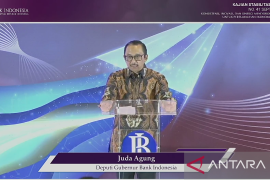Since the past six months the central bank has slashed the key rate by 100 basis points to 5.75 percent. However, no domestic banks have lowered their lending rate significantly.Jakarta (ANTARA News) - Bank Indonesia (BI) lowered its benchmark rate by another 25 basis points to 5.75 percent last Thursday (Feb 9) while businessmen are pinning their hopes on the low lending rate to expand their businesses.
The decision to cut the key rate, locally known as BI rate followed a decline in year-on-year inflation in January.
Bank Indonesia spokesman Difi A Johansyah said the decline in the key rate was important to better drive the country`s economic growth rate projected to reach 6.7 percent this year from about 6.5 percent last year despite slowdown in the global economy.
Since the past six months the central bank has slashed the key rate by 100 basis points to 5.75 percent. However, no domestic banks have lowered their lending rate significantly.
Even though some of the banks have lowered their lending rate it is still hovering above 10 percent. Some quarters believe the fair lending rate should be 2 or 3 percent higher than the BI rate.
Secretary of the Indonesian Businessmen Association (Apindo) of North Sumatra chapter Laksamana Adiyaksa said BI must always urge national banks to lower their lending rate after the BI rate fell 25 basis points to 5.75 percent.
"BI`s step to cut its key rate will be fruitless if national banks do not reduce their lending rate which is still far from that of other countries," he said.
The domestic interest rate is still hovering above 12 percent, well above that of other countries which reaches 3-4 percent, he said.
Chief of the Indonesian Exporters Association (AEKI) Suyanto Husein said because of the lower lending rate in other countries foreign investors could freely buy Indonesian commodities.
"Today the Indonesian commodities are controlled by foreign buyers who get low-cost working capital," he said.
However, Bank Indonesia Governor Darmin Nasution said the decline in BI rate would not automatically lead banks to cutting their credit interest on the ground it was related to many things.
"The credit interest does not merely rely on BI rate. BI rate is one of the factors. We will also discuss banks` business plans (RBB) with the state enterprises minister and the finance minister. That is part of our effort to influence lending rate," he said last Friday (Feb 10).
To lower the credit interest, the central bank along with other relevant parties needed to take extra policies, he said.
Economic observer Jhon Tafbu Ritonga said the decline in the BI rate would not automatically lower lending rate as expected by many businessmen.
"Some people have got wrong perception of BI rate. They liken the BI rate to lending rate. As a matter of fact, the lending rate very much depends on inflation including the wish of shareholders and fund owners," he said last Saturday (Feb 11).
Despite the drop in BI rate, banks would not directly lower their lending rate, the more so if they were requested to lower it to a level which is not far from the BI rate of 5.75 percent.
"It is very unlikely (for them to do so) the more so because the yearly inflation rate of 6 percent is still considered low although it continues to show a downward trend," he said.
If the inflation rate reached 6 percent depositors would most likely withdraw their time deposits which carry an interest rate of 6 percent or slightly higher.
"The government must be able to curb the inflation rate further. Only after that can banks lower their lending rate as expected by businessmen," he said.
Director of Bank Indonesia`s economic research and monetary policy directorate Perry Warjiyo expressed optimism the decline in the Deposit Insurance Agency (LPS)`s benchmark guaranteed deposit rate by 50 basis points to 6 percent will prompt banks to cut their lending rate soon.
"With the decline in the benchmark guaranteed rate, banks will lower their deposit rate and the cost of fund will drop accordingly. If the cost of fund drops the lending rate will decline soon. I believe the lending rate will decline this year," he said on Tuesday.
According to him, the LPS`s guaranteed deposit rate served as a reference for banks to set their deposit rate. Therefore, the decline in the guaranteed deposit rate would prompt banks to lower their deposit rate.
"If the deposit rate falls the cost of fund will drop accordingly so there is no reason for banks not to lower their lending rate," he said.
However, he added he did not know how much the lending rate would decline.
"Every bank has their own target of lowering their prime lending rate to be put in their business plan (RBB). The banks are expected to announce the RBB early March," he said.
He said the prime lending rate consisted of the cost of fund, overhead cost and profit margin. Therefore, if the cost of fund fell the lending rate would go down.
He said Bank Indonesia had no intention to set the lending rate which served as banks` business decision.
"What we want is that banks lower their lending rate because BI rate has declined. This is needed to spur our economy which needs stimuli including those from the banking industry," he said.
He said the LPS should no longer use BI rate as a reference because the effective rate used by banks in the market was BI`s monetary operation rate such as discount facility and term deposit overnight which reached 3.75 percent.(*)
Reporter: By Suharto
Editor: Heru Purwanto
Copyright © ANTARA 2012






